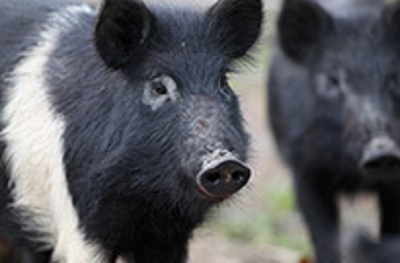DeQUEEN, Ark. (January 14, 2015) - A pseudorabies outbreak has been confirmed near DeQueen in Sevier County. The outbreak claimed the lives of 10 hunting dogs after they encountered feral swine. The dogs were used to chase feral swine near a livestock pasture when an infected hog was caught and mauled by the dogs.
Feral swine are not native to the U.S. They are an invasive species, a public nuisance and a threat to Arkansas. They compete for wild animal food resources, destroy habitat by rooting and wallowing and will eat ground-nesting birds, eggs, fawns and young domestic livestock.
The dogs in Sevier County scavenged and ate the meat from the infected feral swine. Soon after consuming the meat, the dog's showed signs of "mad-itch," a common side effect of the viral infection. The symptoms were reported to the Arkansas Livestock and Poultry Commission, Arkansas Health Department, U.S. Department of Agriculture Animal and Plant Health Inspection Service and the Arkansas Game and Fish Commission.
Samples from the hog and dogs were collected and analyzed by Iowa State University as part of ongoing research on feral swine disease. Feral swine can be carriers of the pseudorabies virus which is transmitted through nasal and oral secretions. The virus is fatal to pets and livestock. The Arkansas Department of Health stresses that pseudorabies is not transmissible to humans, but feral swine can be carriers of multiple viruses, parasites and bacteria that can lead to severe illness, most notably swine brucellosis. Other diseases include anthrax, brucellosis, E.coli, hepatitis E virus, swine influenza virus, leptospirosis, rabies, salmonellosis, toxoplasmosis, trichinosis, tuberculosis and tularemia. Caution should be used when encountering and processing feral swine due to the potential health risks to both humans and pets.
The AGFC uses large-scale trapping as the most efficient and economical means currently available to reduce feral swine populations. Sport hunting of feral hogs has been more hindrance to hog removal than benefit. Illegal relocation of hogs for hunting purposes has spread the problem to new areas. The shooting of individual hogs also thwarts large-scale trapping efforts and makes it nearly impossible to catch the whole sounder, or family group, at once.
In 2013, the Arkansas Legislature passed a law prohibiting the possession, sale or transporting of any live feral hog, except to Arkansas Livestock and Poultry Commission-approved terminal facilities by licensed individuals. The intent of the law is to limit the spread and impact of feral swine, as well as the diseases to domestic livestock producers and native species.


